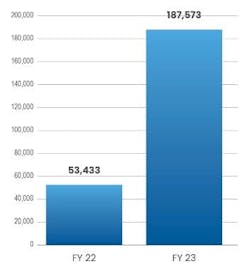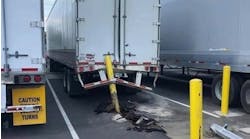The U.S. Postal Service has operated its trucking contracts with a significant lack of safety measures or reporting, according to preliminary results from an audit of USPS contract trucking safety.
“One of essentially the largest freight contractors in the country, doing their work with taxpayer dollars, has been doing so to the lowest possible standard, putting Americans at risk every day,” Zach Cahalan, executive director of the Truck Safety Coalition, told FleetOwner.
The audit, performed by the USPS Office of Inspector General, sought to measure the effectiveness of contract trucking safety controls, compliance, and oversight.
The audit’s report, published Feb. 27, uncovered a concerning lack of procedures and screenings for driver safety. Among other issues, the report found that USPS did not have any centralized process to track fatal truck crashes by its contracted drivers.
According to the report, inspectors found USPS had only limited access to contractors’ safety performance data and did not have enough screenings for drivers. “Continued use of the current freight auction driver vetting processes could compromise the safety and security of mail and other motorists,” the report stated.
See also: USPS announces new targets for EV truck adoption, with 75% electric fleet by 2028
About USPS and trucking
Trucking is an essential part of USPS’s operations, and the postal office is a significant freight contractor nationwide. OIG found that, in 2023, USPS had $5.2 billion in associated costs for roughly 4,600 trucking contracts.
USPS manages two types of trucking contracts: highway contract routes (HCR) contracts, which establish standard freight pricing for reoccurring routes; and freight auction contracts, which establish flexible, short-term freight capacity when HCR contractors cannot fulfill a route.
HCR contracts are more subject to regulations and organizational oversight, while freight auction contracts have fewer requirements. For example, HCR contractors need prior written approval from USPS to employ subcontractors, while freight auction contractors do not need any prior authorization to use subcontractors.
USPS began using the freight auction process in 2022 to expedite operations in emergency situations. The use exploded after its implementation: in 2022, the OIG found 53,433 freight auction trips; in 2023, it found 187,573 trips—a 350% increase.
This more lax freight auction process, paired with its explosion in popularity, became a security concern for the audit.
“Postal Service management appear to be adopting private sector practices, which relies solely upon the brokers and suppliers to manage their subcontracting relationships,” stated the report. “However, this approach results in risks such as a lack of visibility into subcontractor use and potentially unqualified drivers transporting mail, compromising the security of mail and the safety of motorists.”
The audit’s findings
The audit found “significant internal control deficiencies” in USPS’s safety controls, contract compliance, and oversight.
OIG’s report identified three main problems:
1. USPS did not track contractor accidents and fatalities
The Postal Service could not provide information on the frequency, location, time, or involved parties related to trucking contractor accidents.
Even though the Postal Service required administrative officials to report accident information to the Postal Inspection Service, there was no centralized system to collect this information.
2. USPS did not develop appropriate safety requirements or enforcement in its ordering agreements
Second, the report claims the Postal Service’s ordering agreements had two key deficiencies.
A lack of subcontractor visibility meant that USPS did not always know who was authorized to transport the mail. OIG reported that 14 of the 15 contracting officers and administrative officials it had interviewed (93%) did not know when an HCR contract utilized a subcontractor. Six of the seven contracting officers interviewed—officials with the sole authority to award, amend, or terminate highway trucking contracts—were unaware of the HCR subcontracting approval requirement.
Also, USPS did not consistently enforce team driver requirements for its freight auction carriers. The Postal Service’s freight auction service ordering agreements required team drivers for trips exceeding 500 miles, but OIG found trips exceeding this length that were simply not staffed with team drivers.
See also: Clark: Making the roads safer through truck technology
3. USPS’s screening processes were lacking
The Postal Service had a significant portion of its trucking contract drivers moving mail without proper vetting.
Almost 30% of HCR drivers did not have appropriate security clearance, even though USPS policy requires all HCR drivers to have security clearances. In addition, USPS’s use of freight auctions increased dramatically (over 350%) from 2022 to 2023, further lowering the Postal Service’s visibility into driver records.
Screenings for drivers did not always include a trucker’s driving history, either. The freight auction process, designed to accommodate emergencies, has fewer regulatory screening requirements than the HCR process. However, with the explosion in freight auction usage in 2023, USPS was using a significant number of drivers without disclosing the drivers’ history.
However, the audit found even less screening in this expedited freight auction process.
“We also found that Postal Service personnel did not always complete this alternative process, and instead allowed drivers to only present a driver’s license to access the facility and transport mail,” the report stated.
The report’s recommendations
OIG’s report includes recommendations for each of the three identified problems. The report’s recommendations call upon USPS’s VP of transportation strategy to implement appropriate changes—from finalizing accident tracking methodology to requiring freight auction subcontracting authorization.
“Overall, without clarifying subcontractor pre-authorization guidance, establishing requirements to track subcontractors used by contractors, and enforcing the team driver requirement, the Postal Service is at risk for safety visibility and performance issues,” the audit report said. “Specifically, these deficiencies could allow subcontractors with safety violations to transport mail.”





